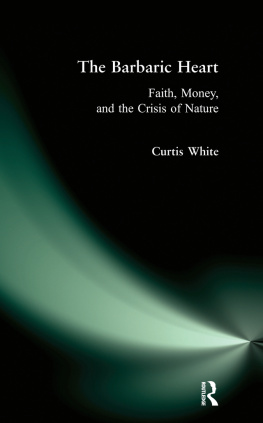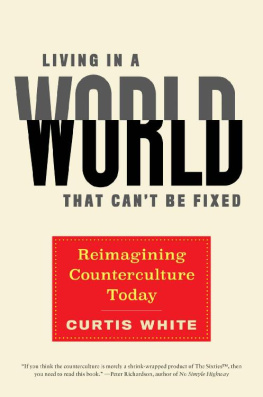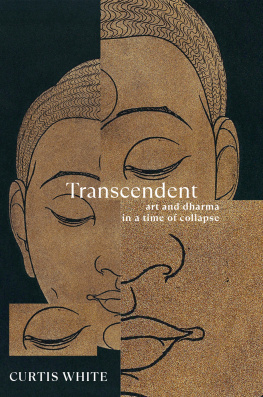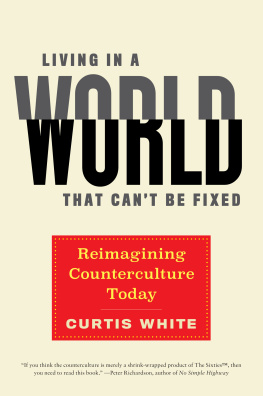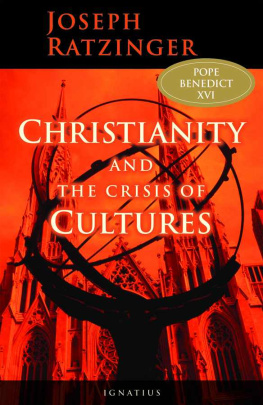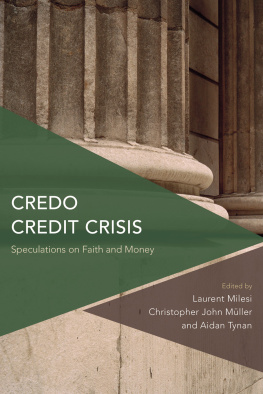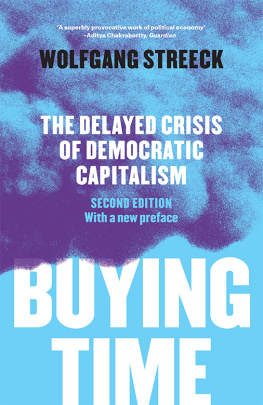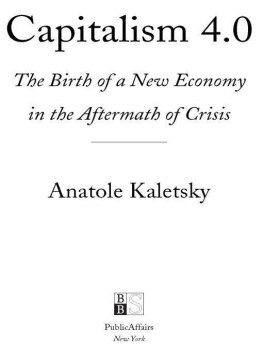The Barbaric Heart: Faith, Money, and the Crisis of Nature
First published 2009 by Paradigm Publishers
Published 2016 by Routledge
711 Third Avenue, New York, NY 10017, USA
2 Park Square, Milton Park, Abingdon, Oxon OX14 4RN
First issued in hardback 2017
Routledge is an imprint of the Taylor & Francis Group, an informa business
Copyright 2009 by Curtis White
All rights reserved. No part of this book may be reprinted or reproduced or utilised in any form or by any electronic, mechanical, or other means, now known or hereafter invented, including photocopying and recording, or in any information storage or retrieval system, without permission in writing from the publishers.
Notice:
Product or corporate names may be trademarks or registered trademarks, and are used only for identification and explanation without intent to infringe.
Portions of this book appeared in a slightly different form in Orion , MarchApril 2007, MayJune 2007, and MayJune 2009; in Harper's magazine, August 2007 and December 2007.
Special above-and-beyond type thanks to Mark Greif.
Book design: BookMatters
Library of Congress Cataloging-in-Publication Data
White, Curtis, 1951
The barbaric heart : faith, money, and the crisis of nature / Curtis White.
p. cm.
Includes bibliographical references and index.
1. Social valuesPhilosophy. 2. EnvironmentalismMoral and ethical aspects. 3. CapitalismMoral and ethical aspects. I. Title.
HM681.W55 2009
170dc22
ISBN 13: 978-0-9817-0912-3 (pbk)
ISBN 13: 978-1-1384-6790-3 (hbk)
For Roger Hodge, Gideon Weil, Peter Richardson, Hal Clifford, and Mr. Leopold Froehlich.
In the late days of the Word, heres to great editors.
We were swept in on the tide of goodwill that brought Barack Obama to the presidency and us to the high office of member of the entertainment committee... of our apartment building. This was an era of change. We put away our Si se puede! posters and rolled up our sleeves to tend to local issues. No longer would Fox News screen in the laundry room! We set the dial to PBS.
The previous administration had put our committee deeply in debt to Blockbuster. We moved swiftly to institute a single-payer NetFlix account.
Never again will the Bingo Club enjoy disproportionate access to inexpensive New Releases, while the Social Action Fraction overpays for bootlegs on the street! we proclaimed during our first prime-time address, in the Residents Lounge, to wild cheers.
But had we really transformed the bankrupt political culture of the entertainment committee? Our test aroseas we might have known it wouldin a crisis of entertainment security. We faced zero hour on the afternoon of the Super Bowl.
Analysts in custodial had been indicating for weeks that the threat of rats chewing through the wiring for the main cable-TV line had been heightened by CableVisions cost-cutting decision to sheathe its coaxial cable with cheese. (Savings went to pay year-end bonuses to the CEO.) Our TVs gone! came the cry from every unit, Sunday at 2 pm.
By the time of kickoff, the entertainment committee was huddled round the ping-pong table. Things were worse than anticipated: A local cable repairman had gotten snarled in the act of rerouting the lines. The Super Bowl could show just fine, but only if we were willing to throw the switch to run the signal through his body across the broken lines, causing the man three hours of torture for the sake of vital national information.
Do it! said the trustees secretary, a holdover from the previous administration. Ive got fifty bucks on the Cowboys!
We have a memo here which proves weve got the right..., said his lawyer, waving a book of Mad-Libswe bought those for the kids!
We have no right! This is wrong! We throw ourselves in front of the breaker box but the others tie us to an exercise bike.
It will all come down to the new chairman of the committee. Hes one of usisnt he? Thoughtful, multiracial, able to admit his mistakes, progressive, good, and oh so Americanwhy, hes told us well have the old days back, fun, and mah-jongg, and trips to Atlantic City again, but with responsibility , and nothing fundamental to be given up; except this time well achieve everything through whats morally right...
The chairman is weeping bitter tears. Boo hoo. Im sad for what Ive got to do. Sometimes weve got to make hard decisions. Hard, hard decisions. For the sake of our values. For which we will apologize to no one! But, boo hooit gives me no pleasure to do this. And he flips the switch.
Nooooooooo!
Come, come, he tells us solemnly, hands folded like an undertaker. Its the Super Bowl.
Curtis White is not the first thinker to associate the progress of Western Enlightenment with destructive rationality. Horkheimer and Adorno completed the most pessimistic portrait of a fully enlightened earth radiating disaster triumphant in 1944. They didnt yet see the enlightened humanized earth perspiring mercury, exhaling bovine methaneor humidifying our moral atmosphere with the lying flatus of what White calls the hot air gods of laissez-faire ideology. This is the price the world has paid for making its mistake of sustaining human beings.
Nor is White the first philosopher to see traces of barbarian valuelessness in America, this greatest nation in the world. which we, her citizens, worship and honor as a new Rome. Nor is he the only patriot to try to separate Americas madness from its sanity, to try to wake up this now mature country, which sticks to adolescent values.
White is, however, unfamiliar, and unique, and courageous, at this momentin 2009in puncturing the pretences of personal, individual guilt as a salve for continuing to do wrong collectively. He tells us our Sierra Club checks are not enoughwhich we knew. Our careful recycling is just pissing in the windwhich we knew, too, and ignored, while we were separating our yogurt containers from our New York Times . We will have to give things up: to de-develop, and deliberately betray the strong economy (at this moment, an object of nostalgia). You cant feel bad about the rotten things you do and thereby come out in the right. You have to stop doing much of what you do. You have to give up your capitalist birthright.
For that declaration alone, The Barbaric Heart is a scary book. Its also humane, with its effort to associate civilization with a morality of the whole. In his search for values to safeguard the earth and its inhabitants, White avoids two of the traps of contemporary environmentalism. First, he refuses to defend nature in terms of the very kind of rationality that chews it up, the acquired language of business that turns environmentalists into quislings, collaborators, and virtuous practitioners of a cost-benefit logic figured in dying penguins, whales, and polar bears. Second, he generally escapes the mystical line that sees the preservation of nature as standing wholly opposed to the continuity of civilization. This line seems to believe that going back to the garden requires a renunciation of civilized tradition as hopelessly corrupt, and a distaste for the West as if it held only one tradition and one line of thought.


